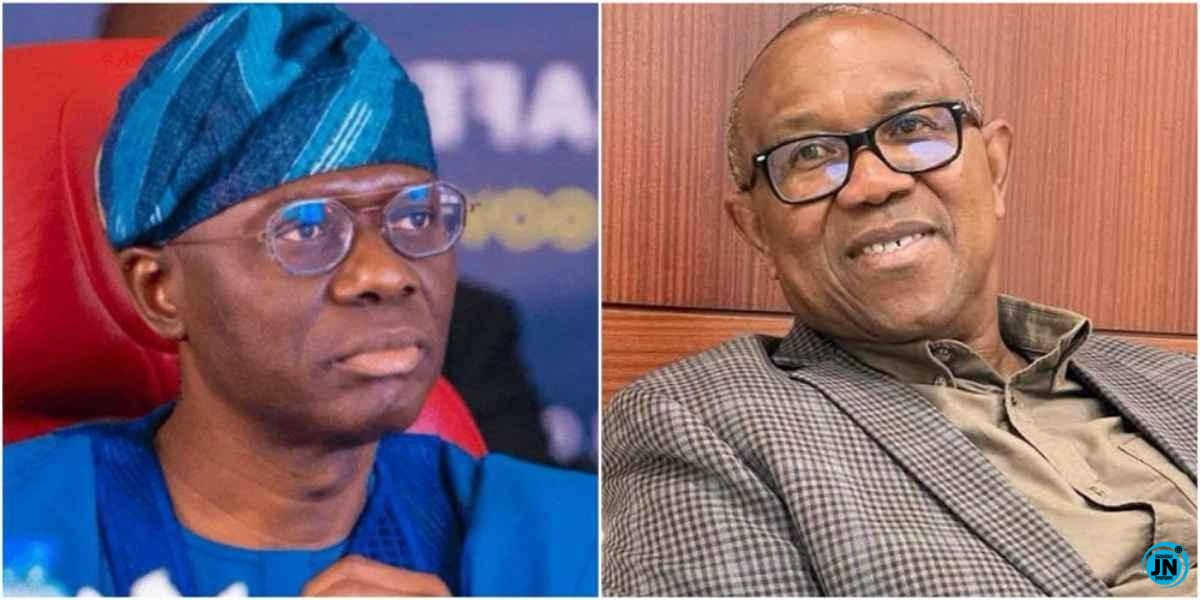
Lagos State Governor, Babajide Sanwo-Olu, has openly criticized former Anambra State Governor and Labour Party presidential candidate, Peter Obi, over remarks he made regarding Nigeria’s current situation during a recent appearance at Johns Hopkins University in the United States.
In a strongly worded statement released on Sunday, Governor Sanwo-Olu accused Peter Obi of consistently making disparaging and unpatriotic comments about Nigeria while abroad. He urged all Nigerians, especially prominent figures who travel internationally, to focus on promoting the positive aspects of the country rather than engaging in actions that “de-market” the nation on global platforms.
Sanwo-Olu stressed that true patriotism is demonstrated by protecting and uplifting Nigeria’s image before the international community, regardless of personal political affiliations or differences with the current government.
“Mr. Obi made unflattering remarks not just about the incumbent Nigerian government but also about Nigeria as a whole,” Sanwo-Olu remarked.
“I find Mr. Obi’s pattern of behavior very disturbing. Prominent Nigerians must project Nigeria positively when they travel abroad. This is not about supporting the government in power; it is about loyalty to our country. We owe Nigeria the duty to market her positively and not bring her down before the global community. That is the true essence of patriotism,” he added.
Sanwo-Olu’s comments were made in direct response to criticisms leveled by Obi against the current administration’s economic policies, policies which Obi claimed were exacerbating poverty and hardship among Nigerians.
Defending President Bola Ahmed Tinubu and his administration’s economic agenda, Sanwo-Olu cited Tinubu’s achievements during his time as Governor of Lagos State, highlighting efforts that had successfully lifted millions of Lagosians out of poverty.
“It is quite ironic that a man like Mr. Obi, who during his eight-year tenure as Anambra Governor neither built a single standalone hospital nor constructed a single new school, and who failed to create a sustainable credit system for small businesses and individuals, would now be criticizing the Federal Government for trying to address these critical sectors,” Sanwo-Olu asserted.
“President Tinubu, during his tenure as Lagos State Governor, built over 200 schools, provided scholarship and loan opportunities to more than 200,000 undergraduates, and established a framework that enhanced Lagos’s economic strength, positioning it as one of Africa’s leading economies.”
Sanwo-Olu did not stop there. He went further to challenge Obi’s actual record in governance by pointing to statistical evidence that showed a significant increase in poverty during Obi’s administration in Anambra State.
According to Sanwo-Olu, the poverty rate in Anambra was at 41.4% when Peter Obi assumed office in 2007 but had risen dramatically to 53.7% just two years later, suggesting a worsening of living conditions under his leadership.
“Mr. Obi talks a lot about good governance, but facts do not lie. When he governed Anambra, poverty worsened rather than improved,” Sanwo-Olu emphasized.
“In fact, it is notable that five years after Mr. Obi left office, his successor, Willie Obiano, was able to significantly reverse the poverty trends, reducing the state’s poverty rate to as low as 14.8%.”
The Lagos Governor further questioned Obi’s moral authority to criticize the Tinubu administration, suggesting that Obi’s failures in Anambra disqualify him from lecturing others on governance and economic policies.
“How can someone who contributed to an increase in poverty during his tenure be the same person accusing others of poor governance? Governor Tinubu, by contrast, has a clear record of policies and programs that lifted people out of poverty,” Sanwo-Olu asserted.
“Mr. Obi should engage in self-reflection before casting aspersions on a government that is committed to addressing the multifaceted challenges Nigeria is facing.”
The back-and-forth between both leaders has since triggered a wide range of reactions across the political landscape, with supporters and critics weighing in on the growing debate about patriotism, leadership records, and the role of public figures in representing Nigeria internationally.

